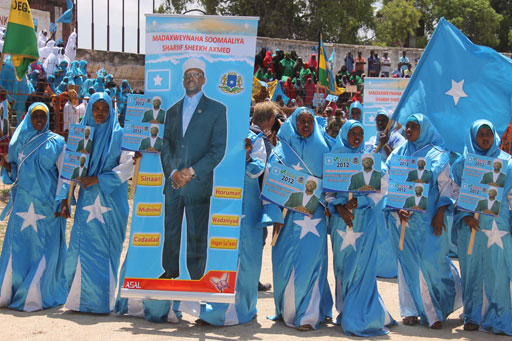[captionpix align=”left” theme=”elegant” width=”320″ imgsrc=” http://www.hiiraannet.com/wp-content/uploads/2012/07/somali-flag.jpg ” captiontext=” Somali women celebrate the anniversary of Somalia’s independence.”]August 20 marked the end of the mandated term for Somalia’s Transitional Federal Government (TFG), leaving all of the hard won political and security advances made over the past three years at stake should the process stall indefinitely. Any resulting chaos coming out of potential political turmoil and the forthcoming presidential election could provide an outlet for al-Shabaab, the embattled Islamic insurgency to regain control over large swaths of the country despite the dramatic reversals the group has suffered in the past year, largely at the hands of African Union troops. In February al-Shabaab formally merged with al-Qaeda and has since developed closer ties to other extremist organisations in the region. It continues to pose a serious threat to Somali security.
On Sunday, a list of the 215 initial members of parliament was released by the selection committee composed of 135 clan elders– 30 from each of the four major clans and 15 others representing minority groups. A further 60 members will be added later as inter-clan rivalries are gradually resolved.
The current members were meant to hold a secret ballot under the auspices of the UN to elect the new Somali president on Monday, but the vote has been delayed. The ballot is expected in the coming weeks and will most likely take place at the international airport which adjoins the AU military base, due to security concerns. The successful candidate will then have one month to choose a prime minister who then has 30 days to put together a cabinet pending approval by the Parliament. None of these elections will involve the general Somali population as per an agreement reached in February.
Thus late October seems like the most realistic start date for a fully functioning government, barring further delays. The new government would become the first to be locally created in Somalia since 1991. Previous transitional ‘governments’ (which existed largely in name only) were cobbled together in neighbouring countries with a high degree of foreign interference.
It is hoped that the new government, even if not popularly elected, can bring an end to over two decades of civil strife and constant uncertainty over the future. It could also provide the leadership needed to overcome the worst drought Somalia has seen in nearly as long, with 2.5 million Somalis threatened by the humanitarian crisis.
Rampant Corruption
Unfortunately many of the presidential candidates including current TFG President Sharif Sheikh Ahmed, Prime Minister Abdiweli Mohamed Ali and outgoing Parliamentary Speaker Sharif Hassan Sheikh Aden are members of a government that is notorious for corruption, something that is embodied by the Somali phrase ‘Maxaa igu jiraa?’ or ‘What’s in it for me?’
A UN report published in June charges that between 2009 and 2010, USD $7 out of every $10 received by the TFG from international donors never made it into the state treasury. This is backed up by a World Bank report that found that $131-million, or 68% of total recorded income over the same period, was embezzled. Although President Ahmed has strongly denied the accusations the report goes on to state that in 2011 alone, $12-million, a sum equivalent to roughly one fourth of the government’s budget, was appropriated by the offices of the same three leaders currently with their hats in the ring for the presidency. Others areas of gross misconduct include profiteering from the issuing of passports and the printing of currency.
A Chance at Reconciliation
The first week of August saw 621 clan elders and Somali leaders vote for a draft version of a new Somali constitution, with 13 voting against it and 11 abstaining. The constitution enshrines Islam as the source of all law and the only religion which can be legally promulgated. This may raise eyebrows especially amongst the international community who had previously called for the protection of all religious groups. Different interpretations of Sharia law are permissible, however, and Xeer—Somalia’s traditional justice code—will no doubt continue to have a great impact on society. Many of the elders who composed the document are religiously conservative as are large segments of the general population, not to mention those involved with al-Shabaab.
In other words, the document had to find its formulation in Islam if it was to be accepted at all. It is the hope of the UN and other international bodies that one day the document will be voted on via a general referendum open to all Somalis. Areas of considerable note are the banning of female circumcision, the right to abortion when the mother’s life is threatened, guaranteed education for children and the outlawing of child labour and recruitment of child soldiers. Strikingly socio-economic and water rights are also included in the text. However, at present these rights amount to little more than moral platitudes; a step in the right direction but with no guarantee of implementation.
Furthermore questions have been raised about how the document will apply to the autonomous territories of Puntland, Somaliland and Galmadug. Puntland introduced a new constitution in April and Galmadug recently elected its own president. Somaliland continues to maintain its self-declared independence from the rest of the Somali Republic.
Given the severity of these issues and the slow pace of reform in Somalia can the new Constitution really encourage reconciliation across a divided and war weary populace? It is clearly a positive development and will reassure Western donors that the country is moving forward, but only time will tell how successful it will really be as the country’s basic law.
[captionpix align=”left” theme=”elegant” width=”320″ imgsrc=” http://cache.boston.com/resize/bonzai-fba/AP_Photo/2012/07/26/1343324420_8579/539w.jpg ” captiontext=” Somali leaders hold up copies of Somalia’s new draft constitution in Mogadishu in late July; the new document bans female circumcision and provides the right to abortion to save the life of the mother.”]
State Building through Unity
To avoid the political turmoil which has so often dominated Somali life, zero-sum politics must be avoided and discouraged. The path towards national unity must be embarked upon wholeheartedly by those in power to the direct benefit of all parties. Winner take all solutions will garner nothing more than a return to the endemic conflict which has scared Somalia for the past 20 years.
Given the enormous efforts made by the international community until now it remains incumbent upon the likes of the UN and the African Union—largely through the AMISOM military force—to ensure the transition to a fully-fledged governing body is completed free from manipulation. Failing this the very elders who voted on the draft constitution and elected the new members of parliament could form an interim government to provide leadership rather than falling back into an irretrievable security vacuum and the resurgence of a re-capacitated al-Shabaab. Somalia is on the cusp of a new dawn and failure is not an option.



